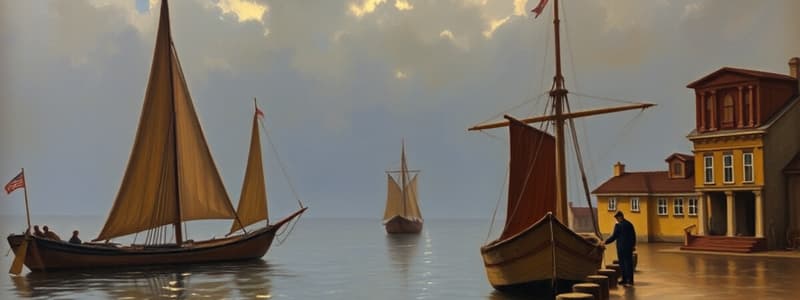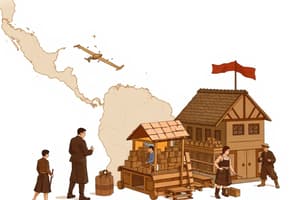Podcast
Questions and Answers
What is Mercantilism?
What is Mercantilism?
An economic system in which nations seek to increase their wealth and power by obtaining large amounts of gold and silver and by establishing a favorable balance of trade.
What did Mercantilism rely on?
What did Mercantilism rely on?
Acquiring colonies to supply Empires with gold/resources.
What are the objectives of Mercantilism? (Select all that apply)
What are the objectives of Mercantilism? (Select all that apply)
- Disbanding the military
- Import raw materials and export finished goods (correct)
- Acquiring favorable balance of trade (correct)
- Maximizing amount of valued metals in one's country (correct)
What are the weaknesses of Mercantilism? (Select all that apply)
What are the weaknesses of Mercantilism? (Select all that apply)
What were the solutions to Mercantilism? (Select all that apply)
What were the solutions to Mercantilism? (Select all that apply)
What is triangular trade?
What is triangular trade?
Describe Trade Route #1.
Describe Trade Route #1.
Describe Trade Route #2.
Describe Trade Route #2.
Describe Trade Route #3.
Describe Trade Route #3.
What were the results of Mercantilism on Britain?
What were the results of Mercantilism on Britain?
What were the results of Mercantilism on Colonies?
What were the results of Mercantilism on Colonies?
What were the results of Mercantilism on Africa?
What were the results of Mercantilism on Africa?
Flashcards are hidden until you start studying
Study Notes
Definition of Mercantilism
- Economic system aimed at increasing national wealth and power.
- Focuses on accumulating gold and silver and maintaining a favorable balance of trade.
Key Reliance of Mercantilism
- Depended heavily on acquiring colonies for resources to enrich empires.
Objectives of Mercantilism
- Achieve a favorable balance of trade.
- Maximize the quantity of precious metals within the nation's borders.
- Maintain a strong military for colonial control.
- Import raw materials while exporting finished goods.
- Establish a robust central government with effective taxation.
Weaknesses of Mercantilism
- Widespread practice among European nations led to isolation and conflict, with nations viewing each other as rivals.
- Limited trade opportunities hindered economic growth and employment.
Solutions to Mercantilism Issues
- Establish colonies to expand territory and resources.
- Direct colonies to serve as markets for manufactured goods and sources of raw materials, exemplified by England's relationship with the US and Canada.
Triangular Trade Overview
- Trade network connecting Europe, Africa, and the Americas, rooted in the slave trade and mercantilist policies of Britain.
- Featured three primary port cities as key points along the trade route.
Trade Route #1
- Slave ships transported from Britain to Africa to acquire forced labor.
Trade Route #2
- Slaves delivered to the 13 colonies to cultivate raw materials.
Trade Route #3
- Raw materials exported from North America to Britain for manufacturing purposes.
Impact of Mercantilism on Britain
- Economic growth fueled by the sale of manufactured goods.
- The wealth generated financed conflicts with France and Spain.
Impact of Mercantilism on Colonies
- Limited economic development in colonies due to British restrictions.
- Increase in smuggling as colonists sought to circumvent trade limitations.
- Colonial economies primarily focused on supplying raw materials to Britain.
Impact of Mercantilism on Africa
- Significant human migration due to slave trade activities.
- Traditional cultures disrupted by the influx of manufactured goods and firearms.
- Population declines noted in coastal areas as a result of the slave trade.
Studying That Suits You
Use AI to generate personalized quizzes and flashcards to suit your learning preferences.





